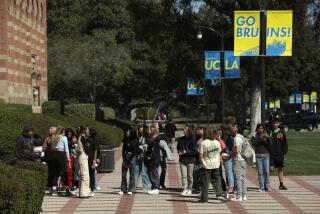Real-Life Lessons in Student Contests
- Share via
Entrepreneur Greg Samson, 28, has the kind of access to top venture capitalists, veteran entrepreneurs and business professionals that would be the envy of most start-ups.
His business plan got the thumbs-up -- and a $250,000 investment -- from a leading venture capital firm, Draper Fisher Jurvetson of Menlo Park, Calif.
Samson has been coached by members of Tech Coast Angels, a well-known Southern California investor group. And venture capitalists have expressed an interest in putting more money into his fledgling firm.
Not bad for a UCLA student who has a year to go before getting his MBA.
Samson’s efforts to launch his company, Precision Reproduction, got a kick start this spring, when he and three other MBA students at UCLA developed a business plan that won the Knapp Venture Competition, which is sponsored by the Price Center for Entrepreneurial Studies at UCLA Anderson School of Management.
Last month, the team and its plan to commercialize a patented medical device and procedure for in vitro fertilization won another student competition. They beat dozens of teams in the statewide Draper Fisher Jurvetson Venture Challenge. The prize was a quarter-million-dollar investment from the venture capital group.
The hands-on experience has been invaluable for the students, said team leader Samson, who worked as an investment banking analyst before returning to school to earn an MBA.
“This allows us to learn a lot of lessons and mistakes of entrepreneurship that aren’t necessarily obvious,” he said.
Winning a student business-plan competition, or just entering one, can raise the profile of a start-up and its principals. At each round of a competition, students’ business plans are usually reviewed by some of the country’s top investors, who offer valuable feedback and coaching on how to create and present an investor-quality plan.
“The mentoring makes a huge difference. It gives the students a leg up,” said David Cremin, general partner of DFJ Frontier, an affiliate of Draper Fisher Jurvetson, and a competition judge.
Winning plans also can put a budding business on the fast track.
Last year’s Knapp winner, Nicholas Seet, for example, found his first big customer and additional funding in the two student business-plan competitions he entered.
Seet’s concept to digitally track radio and television ads impressed a Knapp judge so much that the then-student was asked to present his idea to the judge’s company, NetZero Inc. The national Internet service provider is now one of the biggest customers of Seet’s start-up, Los Angeles-based Auditude Inc.
When Auditude also won the student business-plan competition at Rice University in Houston, the $100,000 investment prize was followed by an extra $1-million private investment by several of the judge-investors.
Samson is hoping for similar results. He’s working full time this summer consulting with other team members and the medical device’s patent holder, to transform the team’s winning business plan into a real-world success.
Student competitions are an increasingly popular way for students to step out of their ivory towers and apply their classroom knowledge to create a viable business plan and possibly a successful start-up.
“The real value is that the students are able to get a real-life experience in building a business plan,” said Bud Knapp, chairman and chief executive of the Knapp Foundation, which funds the $10,000 prize for the UCLA competition.
That’s particularly valuable given Southern California’s entrepreneurial culture, he said.
“The Anderson school is trying to say you are going to encounter this in real life, so take advantage of the opportunity and put yourself on the line,” said Knapp, the former head of Knapp Communications, which published Architectural Digest and Bon Appetit.
More schools now offer students the chance to compete in business-plan competitions than ever before, said Elaine Hagan, executive director of the Price Center.
In addition to Anderson’s Knapp competition, Rice, MIT, the University of Texas at Austin and the Haas business school at UC Berkeley are some of the schools that host major student business-plan competitions.
Not all competition winners go on to launch successful businesses. Some team members never intend to start an actual business. They participate for the experience but then pursue other careers.
And depending on the background of the judges, some excellent business plans may not even make the cut. A plan for a low-tech business, though well executed, may not garner the same excitement as a plan for a high-tech, high-risk venture, Hagan said.
“The judges each year often end up in an animated discussion about what determines the best,” she said.
Precision Reproduction is trying to leverage the initial excitement its business plan generated.
Samson is working closely with the medical device’s patent holder, Dr. Michael M. Kamrava of Beverly Hills, to attract an additional $2.5 million in funding.
The pair will use the $250,000 prize to pay for third-party research and for getting the technology approved by the Food and Drug Administration. That approval is key to their plans to commercialize the device.
As part of the transition from student business plan to viable company, the team is also discussing ownership and titles, said Samson, who does not yet have a business card.
At least one student on Samson’s team, Sanjaya Mohottala, would like to be part of making the venture go forward. Regardless of the outcome, he said, the business-plan competition was worthwhile.
“It’s not just about winning,” he said. “It’s given us a perspective on how you sell a concept.”
Chamber Advisory Panel to Discuss City Contracts
Learn about small-business opportunities involved in upcoming city projects, including expansion of the ports and Los Angeles International Airport, at a meeting Friday of the Small Business Advisory Council of the Los Angeles Area Chamber of Commerce. The discussion by key members of city agencies, which will be held at the chamber from 8 a.m. to 9:30 a.m., is open to the public.
“Our goal is to get small businesses involved early so they can help shape the process, like big businesses do, and position themselves to take advantage of the opportunities,” said council Chairman Brandon Shamim of Beacon Management Group in Los Angeles. For more information and to register, visit www.lachamber.organd look at the chamber calendar.
Cyndia Zwahlen can be reached at cyndia.zwahlen@ la times.com.
More to Read
Inside the business of entertainment
The Wide Shot brings you news, analysis and insights on everything from streaming wars to production — and what it all means for the future.
You may occasionally receive promotional content from the Los Angeles Times.










